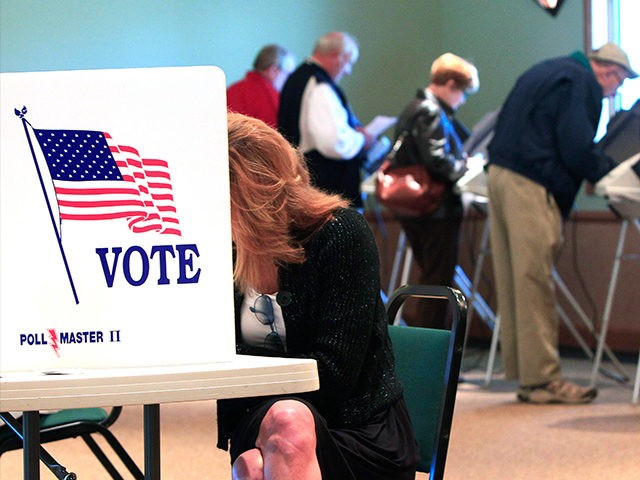Professor John Banzhaf of George Washington University Law School returned to Breitbart News Daily on Tuesday to repeat and intensify his warning about the vulnerability of our election system, in light of a Department of Homeland Security report that hackers have attempted to breach the computerized voting systems in more than 20 states.
“I think we should be very worried,” he told SiriusXM host Alex Marlow:
This is something you and I discussed more than a month ago, and even more recently, just the headlines this morning – the Homeland Security Secretary is urging states to get help. People in Pennsylvania have been alerted to possible attacks. There’s a report of a secret meeting between the FBI and the voting officials in Florida. So this is serious enough we ought to start doing something about it.
I’ve outlined why there’s at least five major factors which we’re worried about, the so-called “perfect storm,” but I think maybe we should be talking also about what we can do about it because time is running out.
There aren’t too many things we can do. Some of the things we can do, we might want to do if we had more time, like getting some of them off the Internet, or making sure that the voting machines have an audit trail, or eliminating voting over the Internet – these are things we can’t do in the remaining weeks. There are only a few things we can do.
Marlow noted that the initial estimate of 12 state election systems assaulted by hackers was swiftly revised up to 23, which Banzhaf said was a sign that Homeland Security is taking the threat seriously, along with other cyber-warfare threats to “critical infrastructure,” like electric power grids and water systems:
For example, we’ve been told that hackers might be able to take over nuclear power plants. They might be able to disable our entire financial system. They might be able to take over our electric grid. They might be able to shut down all of our aviation.
Nobody can say that it’s a five percent probability, or even a one percent probability, but given how serious it is, we have to pay attention.
Bear in mind, again, you don’t necessarily have to change the outcome of the election. All you’ve got to do is create some kind of reasonable doubt about the validity of our presidential election. All you have to do is have one or two voting irregularities, particularly in close states like Ohio, for example. All you’d need is for a screen to pop up and say, “You’ve been hacked by blah blah blah blah.”
People could be worried, particularly if the losing candidate gets up and says, “Yeah, the election was stolen.” If the American people lose confidence in our presidential election, we have a major constitutional crisis – which could be worse than grounding our airplanes for a day or screwing up our financial system for a day.
Banzhaf cited a 2012 article that noted President Obama’s re-election campaign had “recruited a legion of lawyers to be on standby for this year’s election, as legal disputes surrounding the voting process escalate.” The article said that “thousands of attorneys” had agreed to provide “massive legal support that appears to be unrivaled by Republicans or precedent.”
“What I’m suggesting, what I’m thinking is likely to happen, is that each of the major parties, in addition to having lawyers standing by in case there are legal disputes, should possibly have their own volunteer cyber SWAT teams, or cyber-warriors, or whatever you want on standby,” he said of the current election contest.
“I mean, if you get a report of a possible irregularity in a voting machine, or a possible tampering with the election process, that’s not the time to get on the phone and start calling around to professors who teach computers,” Banzhaf warned:
You want to have people standing by. When you get a report of an irregularity, they should be ready to swoop in, to check for it, to preserve the digital evidence, to make sure it isn’t tampered with.
If their software has to be updated, for example, you want to have two people standing by: one for the Republicans, one for the Democrats, to make sure that they are legitimately uploading good software, not putting in some backdoor-type stuff.
…
I think there ought to be, in addition to lawyers and election-watchers, there ought to be people who have skills in computers to be able to come in and take appropriate steps if irregularities are suspected or detected. I think it would be a very good idea for the federal government, with or without the states, to come out with some protocols and guidelines in terms of malware and firewall protection, and so on and so forth.
Banzhaf said he had recently seen an article entitled “How to Hack an Election Machine,” which discussed techniques such as “digital ballot stuffing,” and suggested that “if hackers are able to influence the data that is being pushed to the media, or on social media, through the election machines, they can potentially influence those still to vote, and thus the election, because voters tend to follow the poll leader.”
“You don’t even have to hack any election machine at all. If you got into the machines or the devices or the network that feeds the information to major networks, the mainstream media so-called, and you show X is running far ahead of Y,” he explained, “that could influence the election right there,” adding, “So there’s lots of ways it could happen.”
Breitbart News Daily airs on SiriusXM Patriot 125 weekdays from 6:00 a.m. to 9:00 a.m. Eastern.
LISTEN:

COMMENTS
Please let us know if you're having issues with commenting.